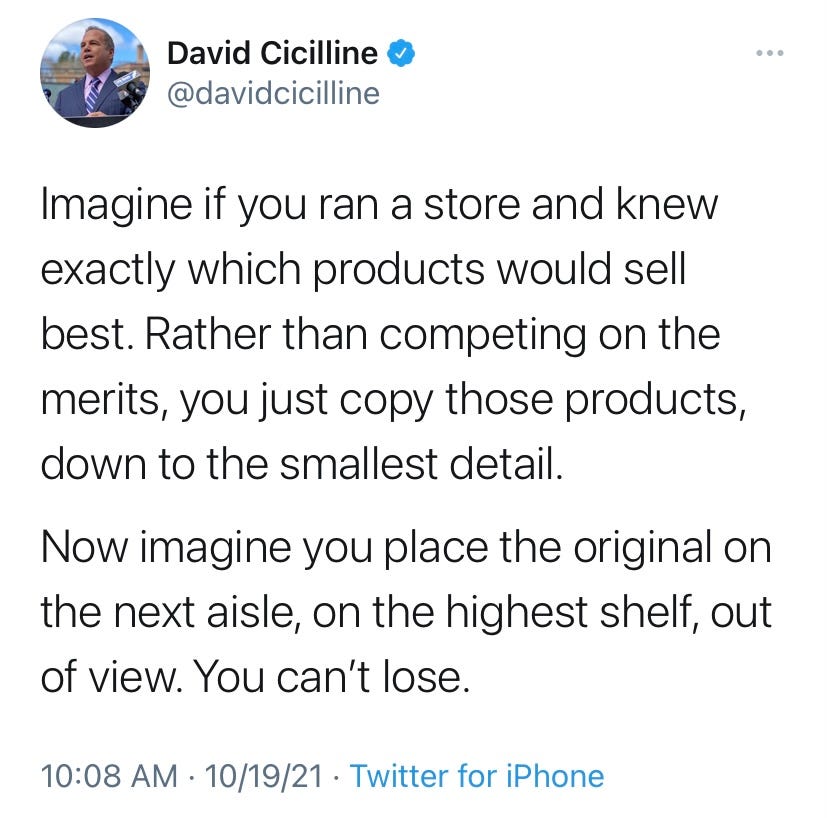How powerful can our bureaucracy get?
Not too powerful, at least on our watch. Plus, our thoughts on calls for algorithm "accountability" and the antitrust debate.
This week was chock-full of tech policy news (which you can read more about below!), so I wouldn’t blame you for missing one of this fall’s greatest tech Twitter faux pas. A member of the House of Representatives was the culprit, and this tweet was the crime.
In his attempt to skewer Amazon, the congressman revealed that he clearly hasn’t been grocery shopping lately (or, perhaps, is suffering from a rare, supermarket-specific form of amnesia). Tons of stores noticeably showcase their own generic products — usually unless another brand pays them to do otherwise.
But what kind of newsletter would this be if I didn’t put you onto some of the greatest-ever store brand groceries? Costco’s Kirkland Signature Creamy Peanut Butter is excellent, and tragically on hiatus until November or December. Its return will be a holiday miracle. Trader Joe’s, which always gets points for creativity, sells an unbelievably tasty pumpkin pancake mix. It also comes in an equally outstanding gluten-free version. Imagine it with maple ice cream. You’re welcome.
FCC. One might think that talking about assessing regulatory fees at the FCC would be one of the most boring subjects around. Not this time, as the FCC is seeking comment on whether it can assess annual regulatory fees on “large technology companies” because they “benefit” from the FCC’s regulations. Jim’s comments demonstrate that before the FCC can assess regulatory fees, it must first have authority over such companies. Otherwise, the FCC might as well just start taxing everyone who uses the Internet.
FTC. Yesterday we held our first in a series of webinars about the Federal Trade Commission — which we long ago dubbed the Federal Technology Commission. Bilal moderated and Berin presented the detailed legal comments we filed a month ago explaining the absurdity of believing that the Congress of 1914 intended the FTC to make binding rules over whatever it deemed “unfair.” We had a lively debate. Nebraska Law Professor Gus Hurwitz explained his leading 2013 article arguing that the FTC does have that power under existing case law (but shouldn’t). Former FTC Commissioner Maureen Ohlhausen presented her joint paper arguing the opposite. Columbia Law Professor Thomas Merrill summarized his authoritative 2002 article explaining how we know whether Congress gave agencies rulemaking power: did Congress authorize sanctions for rule violations? The FTC Act does no such thing. And AEI’s Peter Wallison explained the non-delegation doctrine and how it applies.
The FTC held an open meeting yesterday afternoon, and we submitted several videos as public comments explaining the errors of the agency’s new approach. Andy spoke about how the FTC’s elimination of Hart-Scott-Rodino review through a blog post will keep fair business deals in unfair limbo. Corbin explained that the non-delegation doctrine limits the breadth of the FTC’s rulemaking discretion. Berin warned that in bypassing Congress to write its own privacy regulations, the FTC would fly in the face of safeguards against its own power and enable wildly conflicting state regulations. And Bilal summarized his comments about why the FTC shouldn’t ban exclusionary contracts. Share the Twitter thread here.
Antitrust. In a new Tech Policy Podcast, Corbin and Andy speak with Aurelien Portuese, Director of ITIF’s Schumpeter Project on Competition Policy. Aurelien discusses the problems with antitrust populism, the flaws in the antitrust debate more generally, and his vision for a dynamic antitrust policy centered around innovation. In addition—naturally!—Aurelien shares some thoughts on the great Joseph Schumpeter, the economist who popularized the term “creative destruction.”
Section 230. In the wake of explosive revelations about Facebook from Frances Haugen, legislators rushed to draft ill-performative bills ostensibly to increase “accountability” for algorithmic amplification of content. Ari was quoted in the Daily Caller explaining that such legislation is ineffective because the First Amendment and tort law bar most of the claims that their authors want to remove from Section 230’s protection. He explained this once more on Twitter in response to marketing (ahem) professor Scott Galloway, who argued that algorithmic amplification transforms social media into a “publisher, not a platform,” and that removing Section 230 protection for it is an “elegant” solution. In truth, it is anything but.



